Nihongo Sprit Series : Japanese Mythology
- The Truth of “Impermanence” and “As Is”
- Traditional Culture That Demands Dignity
- Yokai Fit in with Japanese Life
- Japanization of Foreign Culture and Co-existence
- Compassionate Language that Avoids Conflict
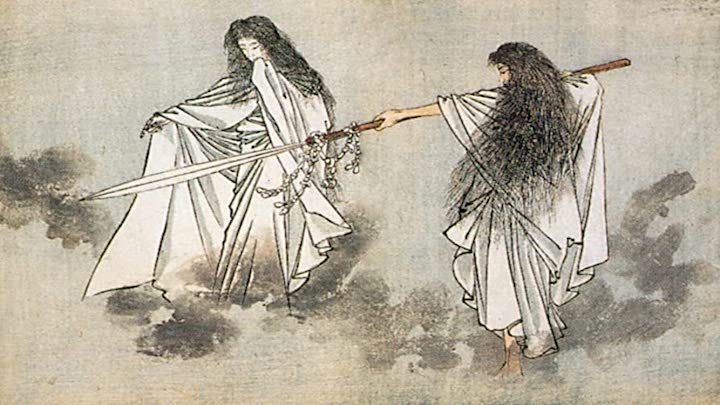
Warming up Audio
Keywords
| Japanese Word | Furigana | English Word | Example Sentence (Japanese & English) |
|---|---|---|---|
| 言葉 | ことば | Language | 言葉には、それを語る人の心が反映されます。 Words reflect the speaker's heart. |
| 思いやり | おもいやり | Consideration | 日本語は「自然との共存」をよしとする思想から生まれました。日本語は「思いやりの言語」と言えるでしょう。 Japanese language is born from the philosophy of coexistence with nature. It can be called a "language of consideration." |
| お疲れ様 | おつかれさま | Good job | 例えば「お疲れ様」など、思いやりを表す日本語独特のフレーズは日常的に使われています。 For example, phrases like "お疲れ様" (otsukaresama) expressing consideration are commonly used in everyday life. |
| お世話になります | おせわになります | Thank you for your support | 「お世話になります」「よろしく(お願いします)」など、相手への心遣いを表すフレーズもたくさんあります。 There are many phrases like "お世話になります" (osewaninarimasu) and "よろしくお願いします" (yoroshikuonegaishimasu) that express consideration towards others. |
| 過ち | あやまち | Mistake | 世界で初めて原爆が落とされた広島の原爆死没者慰霊碑には、こう刻まれています。「安らかに眠って下さい。過ちは繰返しませぬから」と。 The Hiroshima Peace Memorial, where the first atomic bomb was dropped, bears the inscription, "Rest in peace. The mistake will not be repeated." |
| 敬語 | けいご | Honorifics | 日本語には「敬語」という、目上の人に対して使う言葉があります。 Japanese language has "keigo," which are words used for addressing people of higher status. |
| 相づち | あいづち | Nods of agreement | 日本人同士での会話で多用される「相づち」も、日本語独特の慣習です。 "相づち" (aizuchi) frequently used in conversations among Japanese people is also a unique custom in Japanese language. |
| オノマトペ | おのまとぺ | Onomatopoeia | 日本にはさまざまな音を表すオノマトペも非常に多くあります。 Japan has a wide variety of onomatopoeic words that represent various sounds. |
| 言霊 | ことだま | Power of words | 日本では、言霊があると言われます。言葉が持つとされる霊力のことで、発した言葉どおりのことが起こると言われます。 In Japan, it is said that there is the power of words. It refers to the spiritual energy believed to be possessed by words, where what is spoken is said to come true. |
Let's build up your reading skill
 Izanami (いざ波)
Izanami (いざ波)
Words reflect the heart of the person who speaks them. In other words, the Japanese language expresses the heart of the Japanese people.
言葉には、それを語る人の心が反映されます。言ってみれば、日本語は日本人の心を表しているのです。
 Izanagi (いざ凪)
Izanagi (いざ凪)
The Japanese language was born from the idea that “coexistence with nature” is good.
日本語は「自然との共存」をよしとする思想から生まれました。
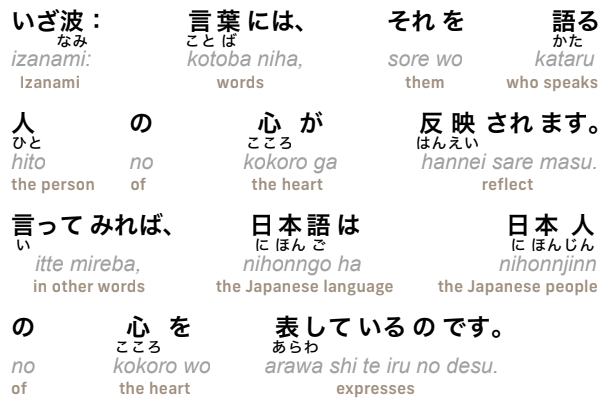
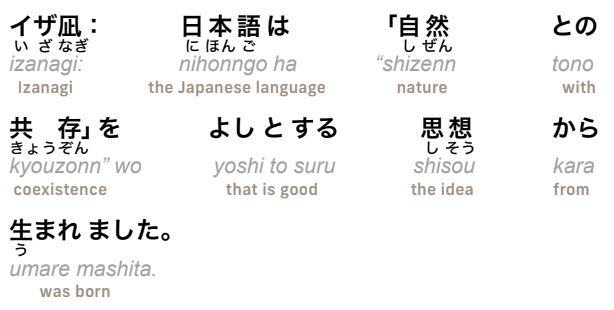
 Izanami (いざ波)
Izanami (いざ波)
If Japanese could be characterized in one word, it would be “the language of compassion.”
日本 語の特徴を一言で表せば「思いやりの言語」と言えるでしょう。
 Izanagi (いざ凪)
Izanagi (いざ凪)
For example, phrases unique to the Japanese language expressing compassion, such as “Otsukare sama” (thank you for your hard work), are used daily.
例えば「お疲れ様」など、思いやりを表す日本語独特のフレーズは日常的に使われています。
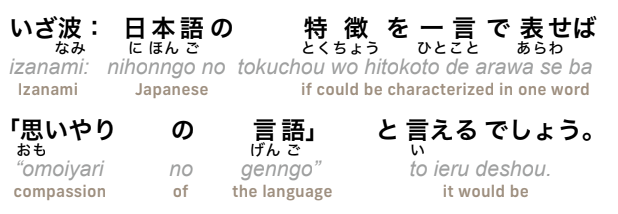
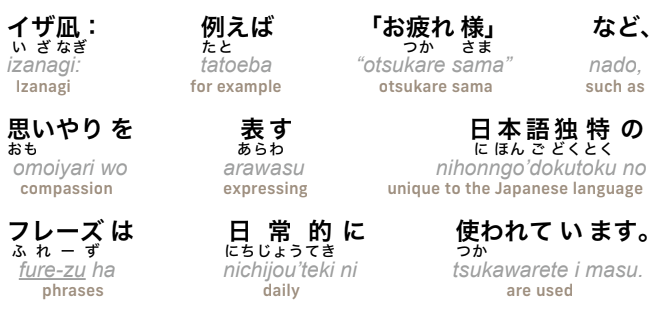
 Izanami (いざ波)
Izanami (いざ波)
There are also many phrases that express consideration for the other party, such as “Osewa ni narimasu (Thank you for your help)” and “Yoroshiku (onegai shimasu) / Best regards (please).”
また、「お世話になります」「よろしく(お願いします)」など、相手への心遣いを表すフレーズもたくさんあります。
 Izanagi (いざ凪)
Izanagi (いざ凪)
In addition to having its own unique phrases, the structure of the Japanese language itself contains the idea of compassion. One such example is that in Japanese, a sentence can be formed even if the subject is omitted.
独自のフレーズがあるだけでなく、日本語の構造自体にも思いやりの思想が含まれています。その一つが、日本語では主語を省略しても文章が成立することです。
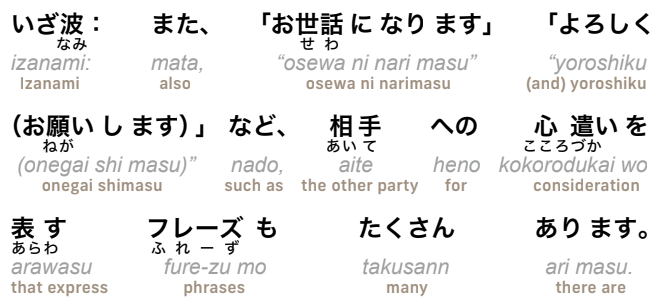
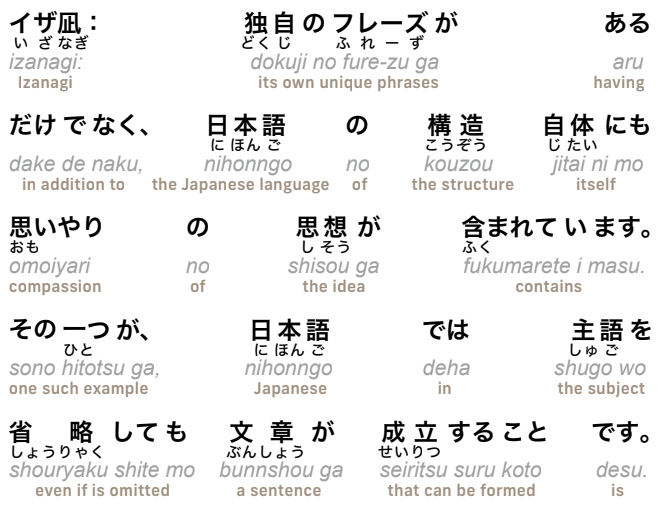
 Izanami (いざ波)
Izanami (いざ波)
For example, you do not have to say “I am” or “you are,” because the person to whom you are communicating will know. This makes it useful when you do not want to specify whose words are being used.
例えば、「私は」や「あなたは」と言わなくても、伝えられる側にはわかるからです。そのため、誰の言葉か特定ていしたくないときにも便利です。
 Izanagi (いざ凪)
Izanagi (いざ凪)
The Cenotaph for the Atomic Bomb Victims in Hiroshima, where the worldʼs first atomic bomb was dropped, is inscribed with the following words. Rest in peace. [We] will not repeat our mistakes.
世界で初めて原爆が落とされた広島の 原爆死没者慰霊碑には、こう刻まれています。「安らかに眠って下さい。過ちは繰返しませぬ から」と。
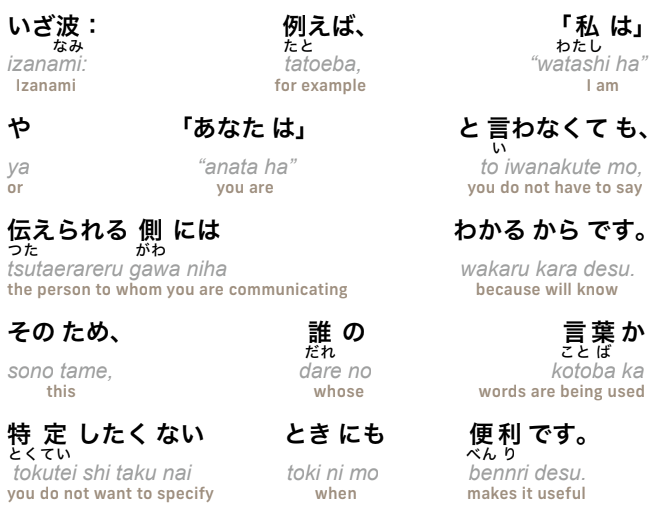
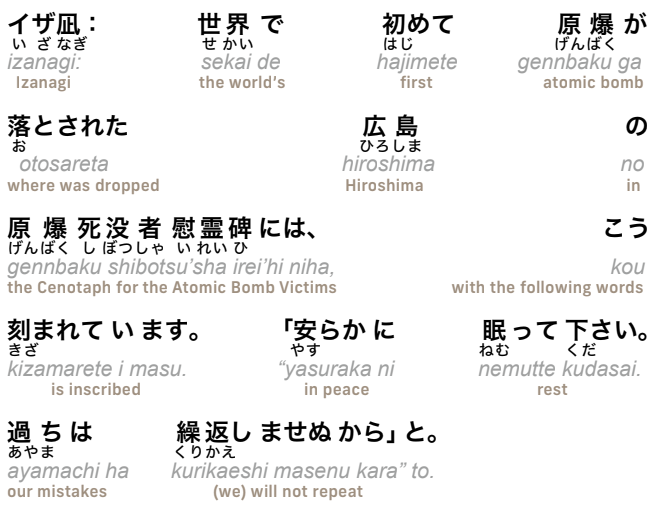
 Izanami (いざ波)
Izanami (いざ波)
It is not stated whether it was the U.S. who dropped the bomb, Japan who started the war, the Japanese, the scientists who developed the bomb, or the U.S. government who had it built that caused the “mistake.”
その「過ち」を起こしたのは、原爆を落としたアメリカなのか、戦争を始めた日本なのか、日本人なのか、原爆を開発した科学者なのか、造らせたアメリカ政府なのか、記されて いません。
 Izanagi (いざ凪)
Izanagi (いざ凪)
This “mistake” refers not to the actions of one individual or country, but to wars and the use of nuclear weapons committed by humanity as a whole.
この「過ち」とは、一個人や一国の 行為ではなく人類全体が犯した戦争や核兵器使 用を指しているからです。
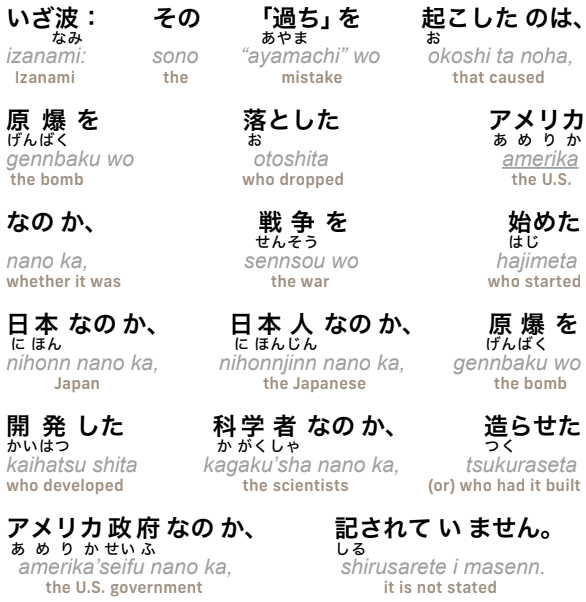
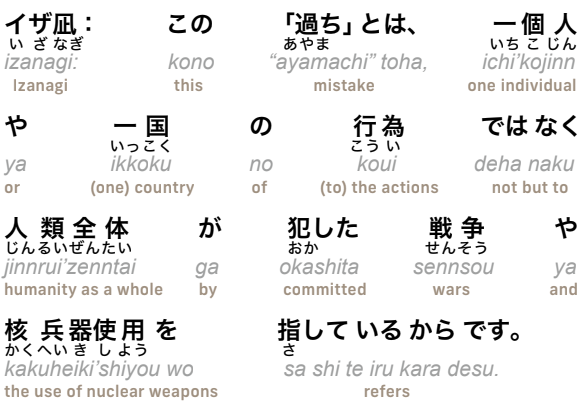
 Izanami (いざ波)
Izanami (いざ波)
Thus, in Japanese you can include what you are talking about without explicitly saying it as the subject. The speaker wants to allow the listener to understand the intention on their own.
このように日本語は、主語を言わなくても、何について言っているのかを含ませる ことができます。これには聞き手に察してもらいたいという意図があります。
 Izanagi (いざ凪)
Izanagi (いざ凪)
Japanese can be said to be a language that avoids conflict. It is said that Japanese tone has no inflection and is difficult to convey emotion, which is also thought to be connected to the spirit of harmony.
日本語は争いを避ける言語とも言え ます。日本語のトーンは抑揚がなく感情が伝わりにくいと言われますが、これも和の精神とつながっていると考えられます。
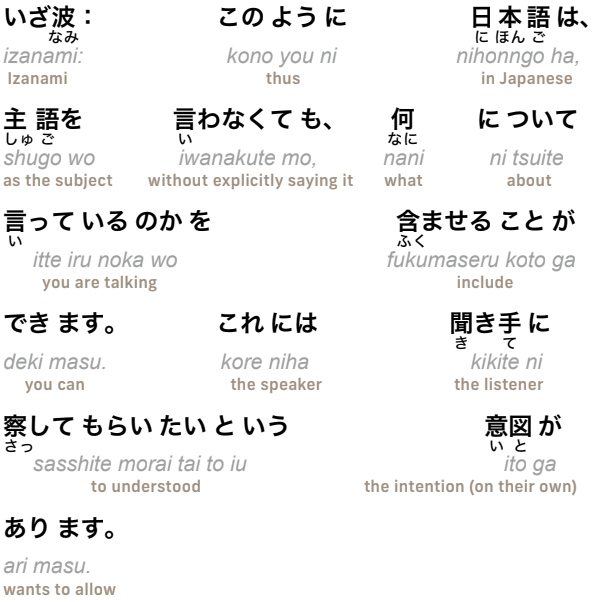
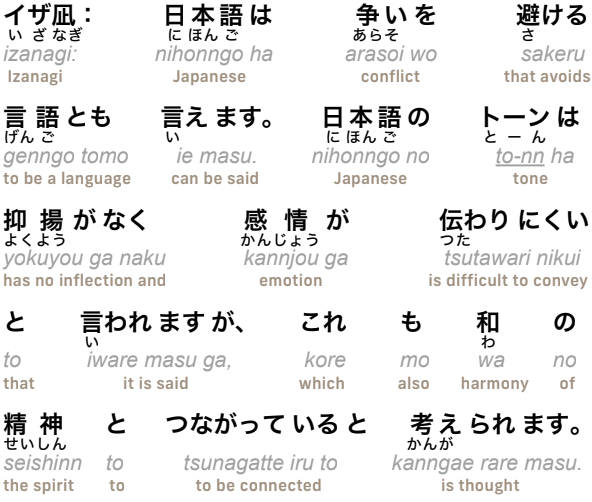
 Izanami (いざ波)
Izanami (いざ波)
We also often hear foreigners say that they do not know what Japanese people are thinking because they do not speak clearly. However, it can be said that the Japanese use ambiguous expressions as a form of wisdom to avoid conflict.
また、日本人ははっきり言わないから 何を考えているのかわからないという外国人の 声もよく聞きます。しかし、日本人があいまい な表現をするのは、争いを避ける知恵とも言えます。
 Izanagi (いざ凪)
Izanagi (いざ凪)
The Japanese language has a manner of speech called “keigo,” which is used to address superiors. In Japanese society, which is based on consideration, order is maintained by clarifying the position of the other party and oneself.
日本語には「敬語」という、目上の 人に対して使う言葉があります。思いやりを ベースとしている日本の社会では、相手と自分の立場を明確にして秩序を保ちます。
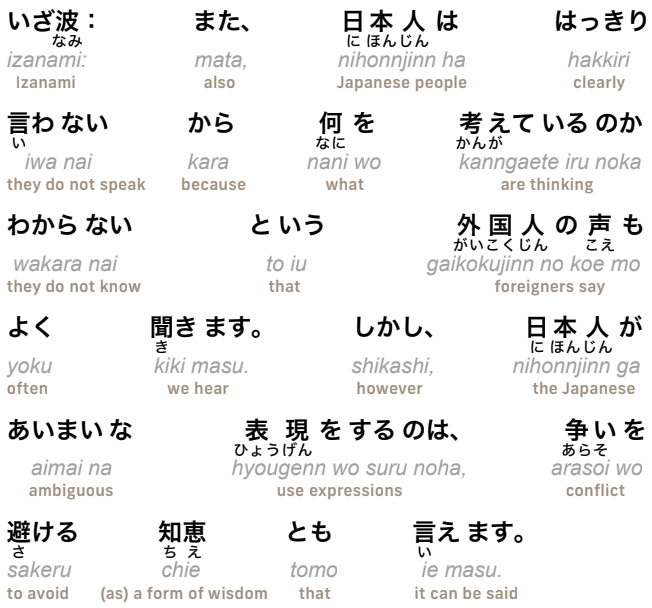
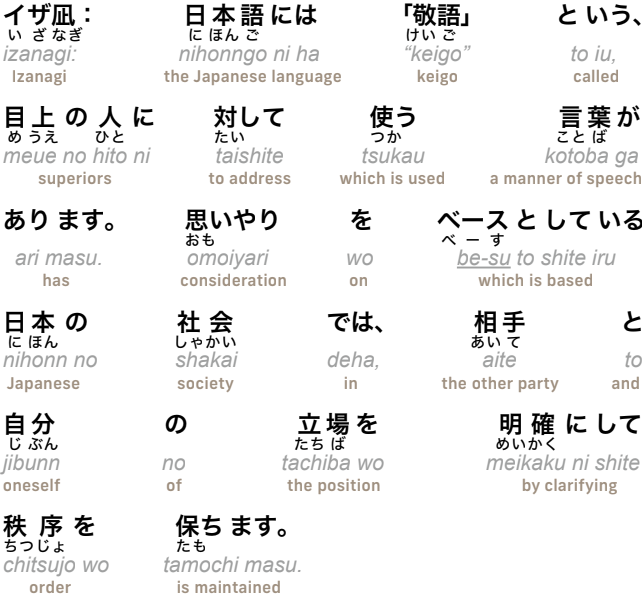
 Izanami (いざ波)
Izanami (いざ波)
“Aizuchi,” (an interjection used to show that a person is attentively listening or that they understand what is being said) which is often used in conversation among Japanese, is another custom unique to the Japanese language.
日本人同士での会話で多用される「相づち」も、日本語独特の慣習です。
 Izanagi (いざ凪)
Izanagi (いざ凪)
As for aizuchi, some learners of Japanese say that it is annoying to be interrupted in every conversation.
相づちに関しては、日本語学習者から 会話にいちいち挟み込まれるのがわずらわしい という意見があります。

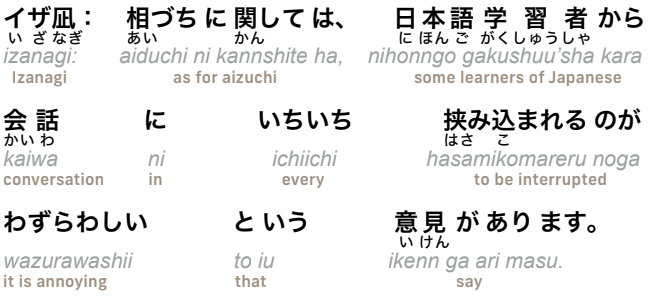
 Izanami (いざ波)
Izanami (いざ波)
However, aizuchi is also a way of saying “Iʼm listening” to everything the other person is saying, in other words, it is an expression of caring and consideration for the other person.
しかし、相づちは、相手の話を漏らさず「聞いていますよ」という意思表示でもあり、言い換えれば相手に寄り添う思いやりの表現なのです。
 Izanagi (いざ凪)
Izanagi (いざ凪)
The Japanese language also has a very large number of onomatopoeias representing various sounds.
日本語にはさまざまな音を表すオノマトペも非常に多くあります。
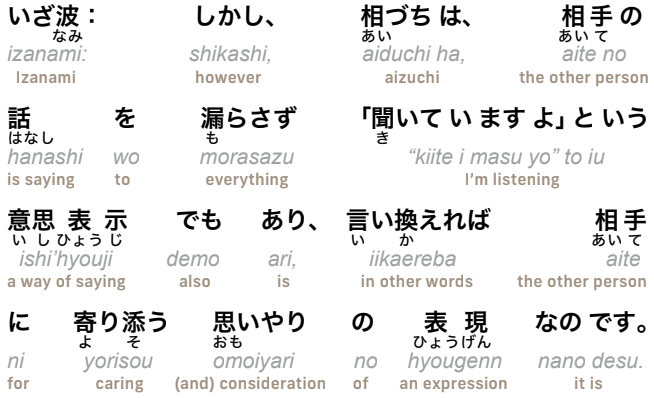

 Izanami (いざ波)
Izanami (いざ波)
Japanese people, who have coexisted with nature, heard the sounds of wind and water, birds and insects not as noise but as the voice and language of life. This is thought to have given rise to a wide variety of onomatopoeia.
自然と共存してきた日本人には、風や 水の音、鳥や虫の声が、雑音ではなく命の声、言葉として聞こえていました。それ が、多彩なオノマトペを生み出したのだと考えられます。
 Izanagi (いざ凪)
Izanagi (いざ凪)
In Japan, it is said that there is a spirit of speech.
日本では、言霊があると言われます。
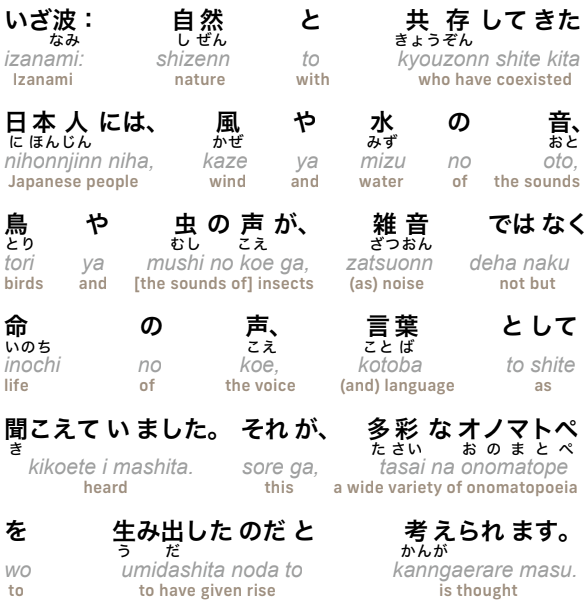
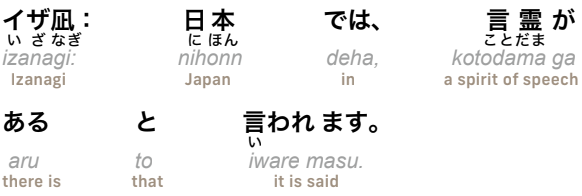
 Izanami (いざ波)
Izanami (いざ波)
It refers to the spiritual power that words are said to possess, and it is said that what is said will happen exactly as it is said. The Japanese language is deeply related to the Japanese spirit of coexistence with nature.
言葉が持つとされる霊力のことで、発した言葉どおりのことが起こると言われます。日本語は、自然と共存する日本人の心と深く関わり合っています。

Finally, let's listen to it in Japanese only!
Eager to dive deeper into this topic? Why not discuss it during a real lesson?
Please register as a We member for free to join the conversation on this topic. Once registered, you'll receive a free interactive lesson as a gift to you!
Share your favorite Japanese expression in the comments below!
We'd love to hear from you.


